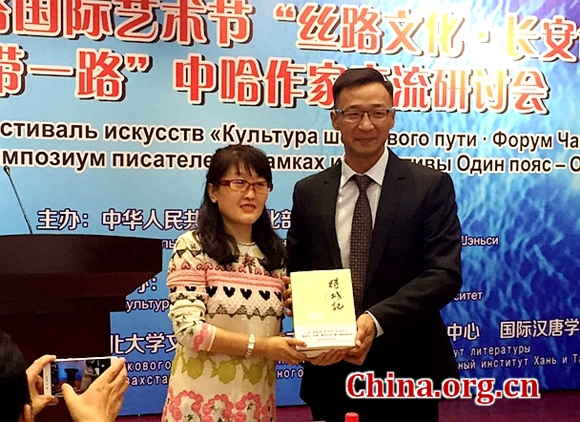Wang Meiying: Telling Chinese stories with a tender heart
- By Mi Xingang
 0 Comment(s)
0 Comment(s) Print
Print E-mail China.org.cn, October 10, 2017
E-mail China.org.cn, October 10, 2017
"Just as a line of smooth silk, literature connects the hearts of life-loving people from different nations and makes them tender and beautiful," said Wang Meiying, a 50-year-old Chinese writer, during her keynote speech entitled "Literature Makes Our Hearts Tender" at the Fourth Silk Road International Art Festival, which was held in Xi'an City, Shaanxi Province, from Sept. 7 to 21. Her most recent work "A Tale of Ancient Capital" was gifted to international delegates during the festival.
Wang has committed herself to telling Chinese stories for decades. Like many great writers in history, Wang suffered a difficult childhood and resorted to expressing herself with a pen in her early years. She lost her father at six, mother at seven and grandma at 11, and lived with her little brother under care of neighbors.
She began to write works at 18 and her second novel entitled "Mud Hut" is composed of 40,000 Chinese characters and was completed in three days when she was 20. The mud hut was the only inheritance that her family left for her and her brother. "I had nothing to lose when I was sitting in the hut with tears on my face and I can only embark on the path of writing with courage," she recalled. After "Mud Hut" was published on influential literary magazines, she received attention and was funded to pursue her study at Northwest University in Xi'an.
After graduation, Wang had been a reporter and editor in Xi'an for over ten years, which provided great experience for her later literature creations. In recent years, she quit her job and became a freelancer. She visited many cities and counties in Shaanxi and lived together with peasants under conditions of road and bridge construction, water source preservation, library establishments, and registration and funding for poor students in rural areas.
In the past two years, she also went to Inner Mongolia Autonomous Region, Guizhou Province and Jiangsu Province, and revisited the Maritime and Inland Silk Road for life observation and social investigation. "Be it in ancient capitals or rural areas, I can always experience the virtuous hearts of known or unknown people and I was approaching literature, the people, ideals and the era in a sincere and authentic way," she said.
The stories of ordinary Chinese people that she has experienced are presented in her most recent novel entitled "A Tale of Ancient Capital," which became a hit in literary circles and was listed as a best seller soon after it was published in May this year. First published on the magazine of Chinese Writer, "A Tale of Ancient Capital" describes a contemporary story of three protagonists who left their hometown village named Peach Flower Ditch in Shaanxi Province and then strived to make a living in Xi'an, the ancient capital and present modern-day city. The novel involving three generations displays the feelings of surprise, confusion, gain, loss, and growth of the new generation of urban citizens.
"Relevant to real life, 'A Tale of Ancient Capital' is intoxicated with and strives for a sharp writing style, employs brilliant, hard and harsh words, resorts to and promotes traditional narration modes, and combines with modern poetic images dotted with outbursts of passion, so as to tell a story of gain and loss either overtly or covertly in a distinctive way," recommended Wang Meng, a renowned Chinese writer and former Minister of Culture.
Li Jingze, a renowned Chinese literary critic, commentated: "'A Tale of Ancient Capital' witnesses the growth of a writer. Be it in cities or villages, it is the world with love that we should treat with awe. The figures in Meiying's novel appear like prayers before Buddha, enduring pain but with brightness lying ahead."
"'A Tale of Ancient Capital' has a grand landscape, delicate words, powerful strength and dynamic scenes. Common people, the secular world, reality, cities, stories, and unknown realms appear more mystical and unique under her writing." expressed Jia Pingwa, a renowned Chinese writer.
"Meiying's works are grand, natural and genuine," said Tao Haisu, a senior consultant of Mercuria Energy Group. "I like her works and support her."
The novel is now being translated into English and Japanese, according to Wang. She expressed her great ambition for her works to go global and enable more foreign readers to read them during the festival. "I won't write words that are pointless and poison the minds of people," Wang said. "It is the responsibility and obligation of being a writer to write heartfelt feelings, with no flattering and tricks, and strive to make the words touch and comfort readers."







Go to Forum >>0 Comment(s)